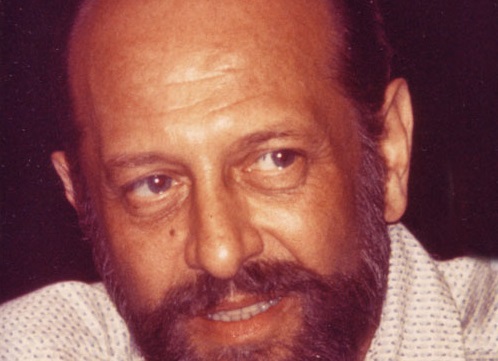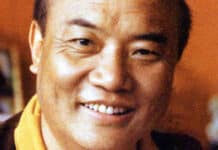
Yuli Shenderoff was born in Russia in 1920 at a time of pogroms against the Jews. As a very small boy, he learned to lie when strangers came to the door and asked about the whereabouts of his relatives. When he was eight, he and his family managed to flee to France, where his name was Gallicized to Jules Chender. When he was nineteen, he escaped from a Nazi detention camp in France, a way station from which he would, almost certainly, have been sent to the concentration camps. A few years later, in 1940, he arrived as a refugee in the United States.
By all accounts, Yuli (as he always remained to his family and friends) was a person of tremendous integrity and poise, whose first dream of becoming a scientist was disrupted by obligations to a family business in Paris after WWII. Nevertheless, he remained a life-long student who told his sons when they were quite small that when he retired he wanted to study Buddhism. He would tell his son Robert bedtime stories about space in which he explained that behind the unimaginable emptiness of the universe there “was nothing — not even nothing.” As a businessman he was widely admired for his sense of fairness and honesty. His advice to his son Michael on entering business was: “My idea of a good business deal is when you use your intelligence to make things better for everybody involved.” Yuli’s wife, Selda, and his two sons became students of Chögyam Trungpa Rinpoche.
Yuli Chender met Chögyam Trungpa a few weeks before he died of stomach cancer in 1973, at age 52. This short excerpt from a Chronicles interview is Michael’s recollection of the day his father met his guru. Rinpoche almost always seemed to enjoy meeting people. He was genuinely interested in who they were and how they arranged their lives, and he had a remarkable ability to engage people on their own terms. For years after this one brief encounter, Rinpoche would use Jules Chender as an example of an ordinary person who had reached some level of attainment in their life.
Following is an excerpt from an interview with Michael and Julie Chender that took place at their home in Halifax, 18 March 2004.
Chronicles: Tell me about the time Rinpoche met Jules.
MC: Well, our father had always had a Buddha on the table of his study, and said he would like to study Buddhism when he retired. He didn’t know much about it, but he was a very decent person and very intellectually curious. He liked to study and read; those were his great pleasures.
In March 1973, Rinpoche was in New York staying at the Dharmadhatu, and I arranged for him to meet my parents. My dad was dying (he had stomach cancer), and he was at home in bed most of the time. Rinpoche and I took a cab to my parents’ apartment in Central Park West, we rang the doorbell and my father came actually almost running to the door, which was not his normal style at all. He opened the door wearing a very beautiful Japanese silk kimono that he used to wear, and when Rinpoche came in, he said, “I’ve been waiting so long to meet the man who has made such a change in my son.” That really got me, as you can imagine. I was both shocked and moved. Up to that point, my mother had been somewhat jealous, thinking that I had replaced my father with Rinpoche. But here was my father greeting him with open arms. Later my mother became a student of Rinpoche’s and they developed a wonderful connection as well.
We sat in the living room, which was very light, with a large window facing the park and another facing the street. At my father’s suggestion I served Rinpoche a glass of scotch and poured something for myself. I remember becoming blissed out sitting there, which was not my style, but there was a wonderful feeling and the room seemed very bright and I guess I sort of drifted off to some extent. Then I noticed my father was trying to get my attention. Rinpoche also noticed it and made some comment. My father was pointing at Rinpoche’s glass, trying to get me to wake up and serve him another drink. Rinpoche said something to my father and my father said, “Well, there are two types of emptiness. One is when things are empty and that’s just the way they are and should be, and the other is emptiness that demands to be filled, like your glass.” Well, that was a big success. My father wasn’t a bullshitter; if he said things it was just what he was thinking. We were there for about an hour or an hour and a half, my mother asked some question, but I don’t remember much of the conversation. When we left, Rinpoche said, “Your father is so wise. Is he a rabbi?” I laughed and told him, “Not only isn’t he a rabbi, he hates religion.” My father was very emphatically antireligious, seeing it as the source of endless harm and stupidity.
That was their one and only meeting. My father died a few weeks later. In that one meeting he had made a very strong impression on Rinpoche, which was quite unexpected and extraordinary. For years, people would come up to me and say, “Rinpoche was telling me what a wonderful person your father was.” One time he said to me, “If your father had lived I would have studied with him. He was a master of the phenomenal world.” At one Kalapa Assembly Rinpoche said, “…it was like meeting Jamgon Kongtrul’s brother.” My brother and I were both there at the time.
Once, during the period of time after my father’s death when I was still grieving and confused, I found myself getting upset with Rinpoche. He was saying all of these complimentary things about my father and I said, “Well, that’s all fine, but he still died in lots of pain.” I just couldn’t, you know, reconcile it. And then I immediately felt that I’d overstepped my bounds and I apologized for getting mad at him. He said “No, don’t apologize. That’s what we have to share.” I remember that particular incident was very, very moving for me. Unfortunately, I actually couldn’t reciprocate that openness at the time. Rinpoche’s invitation to open up like that was wonderful, but it wasn’t something that I really had the confidence to do.
When Julie and I got married, Rinpoche said something like, “Your dad is looking after you.” But of course, he said it in a non-hokey way…just a sense that he was around. At one point he said that my father had become a drala, associated with RMDC.
I already had a wonderful connection to my father in terms of the transmission of his business, and an appreciation of the goodness, decency and quiet bravery in how he conducted himself, but I didn’t think of him as some kind of highly enlightened person particularly. That’s not the way I would have seen him. Rinpoche’s admiration for my father helped me see things differently. I saw that my father had been pointing me in directions that were extremely valuable from a Shambhala teachings point of view. Without Rinpoche’s help, I wouldn’t have necessarily seen that in my quest for, quote, enlightenment.












